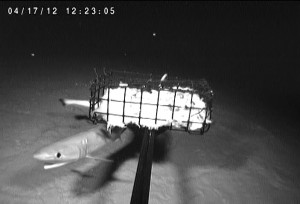
The deep sea is one of the largest, least explored, and most unique ecosystems on the planet. An enormous variety of weird and wonderful creatures make the deep sea their home, including many species of sharks. A new project, headed up by our friends at the Cape Eleuthera Institute, hopes to learn more about these sharks.
According to Edd Brooks, CEI’s shark research and conservation program manager,
“About half of all known species of sharks make this cold, dark high pressure environment their home, and new deep water species are being described all the time. The issue we are currently facing is that basic information about the taxonomy, biology and ecology of these animals is virtually non-existent, yet they are already being harvested by commercial fisheries. The little we do know about deep water species is worrying, in that they are thought to be more sensitive to fishing pressure than all other fish – and look what we have managed to do their more robust shallow water cousins already. The worry is that in some areas, we are already be losing species before they can be described taxonomically.”
Since the deep sea is largely inaccessible by humans without submersibles, the research team* is utilizing an elegant solution: a specialized baited underwater video cameras called Medusa. Baited underwater video cameras are an increasingly common research tool –a recent highly publicized study called them “chum cams”, and I’ll be using similar technology for my own Ph.D. research. However, the Medusa, owned by the Ocean Research and Conservation Association and loaned to CEI for this project, is unique. These cameras can film in the extremely low light found in the deep sea by using “far red” light, which doesn’t influence behavior of fishes since they can’t see light in those wavelengths. Additionally, these cameras can withstand the pressure found at over 6,000 feet, and include instruments that can measure water temperature and salinity.

To date, the team has deployed the Medusa only a handful of times, but much more is planned. In addition to the valuable data obtained about these poorly-studied sharks, this project provides a valuable opportunity for education. Students at the Island School, a high school semester-abroad program affiliated with the Cape Eleuthera Institute, have gotten to participate in every step of the project. The research itself is just getting started, but Edd Brooks is excited about preliminary results and sees a lot of potential for the future.
“The basic questions we have approached in the last couple of years are just the start of the contributions we hope to make to the growing body of deep water knowledge – hopefully paving the way for some sensible management decisions,” he said. “Long term, the goal is to document the deep water ecosystem at a spatial and temporal resolution that is rarely implemented. The easy access to deep water (~20 min on the boat to 1800 m) allows us to approach research questions using a shallow water paradigm – i.e. good sample sizes that test specific hypotheses, as opposed to the ‘exploration’ driven paradigm of traditional deep water research. Our next steps are looking at specific shifts in community structure at varying depths and over different seasons (we are already seeing a seasonal influx of female Centrophorus sp. in the autumn, and looking at the importance of bottom structure and how this influences benthic communities including top predator distribution. “
Here are some video highlights of the project so far:
*In addition to the Cape Eleuthera Institute, the research team includes scientists from the Ocean Research and Conservation Association, the Florida State University Coastal & Marine Laboratory, Stony Brook University’s Institute for Ocean Conservation Science, and Microwave Telemetry, inc.
I spent 10 days at CEI last summer and was able to participate in deep-sea shark research (longlines) with the institute and Dr. Dean Grubbs. Interacting with a bluntnose six-gill shark was definitely one of the best experiences I’ve ever had. Glad to see the program is doing so well!